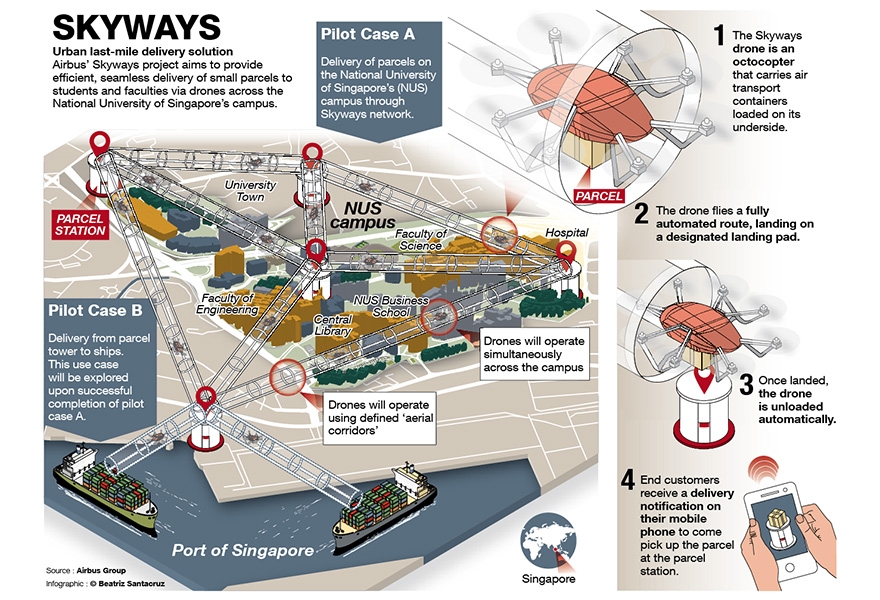Latest News.
Airbus is building a flying, driverless taxi to test in 2017

A team of Airbus engineers based out of Silicon Valley is currently working on the development of a new autonomous flying vehicle platform — one that’s been dubbed “Vahana” by those involved.
The flying-vehicle platform — which is intended to be both used for cargo transport and passenger transport purposes — is slated to begin real-world prototype testing by the end of 2017.

“We believe that global demand for this category of aircraft can support fleets of millions of vehicles worldwide,” stated Rodin Lyasoff, lead Airbus engineer on the project at A3 (the Airbus innovation outpost in Silicon Valley). “In as little as 10 years, we could have products on the market that revolutionize urban travel for millions of people.”

“Many of the technologies needed, such as batteries, motors and avionics are most of the way there,” continued Lyasoff. The project will also require very reliable sense-and-avoid technology, he noted — while such technologies are now being deployed in the automotive sector, no mature solutions are yet available for the aviation sector.
“That’s one of the bigger challenges we aim to resolve as early as possible,” stated Lyasoff.
Airbus is apparently anticipating high demand for Vahana, which would drive associated costs down, making the technology more economical than it may seem at first.
“A3 is powering ahead with Vahana, and as is typical for Silicon Valley, the company thinks in terms of weeks, not years,” an Airbus statement read.
AVweb provides more: “Officially underway since February, the project’s team of internal and external developers and partners has agreed on a vehicle design and are beginning to build and test vehicle subsystems. Meanwhile, developers in France and Germany are working on an electrically operated platform concept for multiple passengers, Airbus said. This aerial vehicle, which goes by the working title of CityAirbus, would have multiple propellers and would resemble a small drone in its basic design. While initially it would be operated by a pilot — similarly to a helicopter — to allow for quick entry into the market, it would switch over to full autonomous operations once regulations are in place, directly benefitting from Vahana’s contribution. The feasibility study has already been completed and the conclusion is favorable, Airbus said.”
The company envisions a scenario where interested customers could simply book a seat on a CityAirbus through a smartphone app, then proceed to the closest helipad and “climb aboard to be whisked away to their destination.”
Courtesy : Clean Technica

Middle East
British Airways Resumes Daily Flights to Abu Dhabi, After 4-Year hiatus

British Airways made its way back to Abu Dhabi, landing at Zayed International Airport. Following a four-year break in service, both crew and passengers were greeted with enthusiasm.
In the summer of 2024, British Airways plans to launch a daily route, utilising a Boeing 787-9, from London Heathrow to Abu Dhabi. The new route enhances ties between the UAE and the UK and expands vast worldwide network, catering to passengers who may be visiting friends and family or travelling for business.
Arriving in Abu Dhabi at 08.30+1, flight BA073 to Abu Dhabi leaves London Heathrow at 22.25. Departing at 10.10 and landing at London Heathrow at 15.20 is the inbound flight (BA072).
The chief executive officer and managing director of Abu Dhabi Airports, Elena Sorlini, stated: “We are delighted to welcome British Airways to Zayed International Airport. Their daily schedule is expected to improve connectivity and stimulate travel and business.” Visitors may experience the dynamic capital of the United Arab Emirates like never before at our brand-new, award-winning, state-of-the-art terminal, where they will be welcomed with the best kind of Emirati hospitality.”
Flight schedule:
| London Heathrow (LHR) to Zayed International (AUH)All times are local | ||||||
| Season | Flight number | Departing LHR | Arriving AUH | Flight number | Departing AUH | Arriving LHR |
| Summer ‘24 | BA73 | 22:25 | 08:30+1 | BA72 | 10:10 | 15:20 |
| Winter ‘24 | BA73 | 22:25 | 09:30+1 | BA72 | 11:10 | 15:20 |
Airlines
EU Bans Turkish-based Southwind Airlines due to links with Russia

In a significant move reflecting the ongoing geopolitical tensions, the European Union (EU) has taken measures to prohibit Turkey’s Southwind Airlines from utilizing its airspace.
The decision, stemming from alleged connections with Russia, underscores the broader repercussions of Russia’s actions in Ukraine and the subsequent international sanctions imposed.
The ban, enforced on March 29, disrupts Southwind Airlines’ operations, initially leading to the cancellation of flights. The Finnish transport authority Traficom, headed by Jarkko Saarimäki, has been instrumental in elucidating the rationale behind the EU’s decision. Saarimäki’s assessment highlights a concerning lack of substantial ownership and effective control held by Turkish entities within Southwind Airlines.
Established in 2022 in Antalya, Turkey, Southwind Airlines had primarily focused on flights originating from Russia. However, scrutiny into its ownership structure has revealed apparent links to Russian stakeholders, prompting concerns over its allegiance and operational control. Saarimäki’s assertion of Russian influence over the airline’s affairs underscores the broader geopolitical implications of such connections.
The EU’s ban extends beyond merely restricting Southwind Airlines’ access to its airspace; it also encompasses prohibitions on takeoffs, landings, and overflights within EU territory. Consequently, the airline faces operational hurdles, impacting its routes not only to Finnish destinations like Helsinki but also to prominent German cities and potentially planned routes such as Zurich.
This development aligns with the stance adopted by other Western nations, including the United States, the United Kingdom, and Canada, which have implemented similar bans on Russian airlines. Such coordinated actions underscore the global resolve to hold Russia accountable for its aggressive actions in Ukraine and to mitigate potential security risks posed by entities with alleged ties to Russian interests.
Airlines
Indigo contributed 31 crores to India’s political party for election funds

In a recent disclosure, it has come to light that Rahul Bhatia, the promoter of IndiGo, along with companies under his InterGlobe Group, has made significant donations totaling Rs 56 crore to four political parties. Additionally, SpiceJet, led by Ajay Singh, has contributed Rs 70 lakh to the Aam Aadmi Party (AAP).
The data further reveals that InterGlobe Air Transport Ltd, a part of the InterGlobe Group, purchased 11 electoral bonds valued at Rs 1 crore each on May 10, 2019, amounting to a total of Rs 11 crore. Similarly, Interglobe Aviation, the parent company of IndiGo, acquired 5 electoral bonds worth Rs 1 crore each on October 23, 2023, totaling Rs 5 crore.
InterGlobe Real Estate Venture and InterGlobe Air Transport Ltd directed the lion’s share of their political contributions, totaling Rs 31 crore, to the Bharatiya Janata Party (BJP). Surprisingly, the second-largest recipient was the Trinamool Congress (TMC), receiving Rs 16.2 crore from Bhatia. Additionally, InterGlobe Aviation Ltd allocated Rs 5 crore to the Congress party, while Bhatia contributed Rs 3.8 crore to its ally, the Nationalist Congress Party (NCP).
Rahul Bhatia, individually, also made substantial contributions through electoral bonds, purchasing bonds worth Rs 20 crore. On April 7, 2021, a total of 29 electoral bonds were acquired, with 19 bonds valued at Rs 1 crore each and 10 bonds at Rs 10 lakh each, summing up to Rs 20 crore. When combined with the donations from IndiGo and its affiliated companies, the total contributions from the promoter and associated entities reach Rs 56 crore.
On the other hand, SpiceJet, once a prominent player in the Indian aviation industry, has seen a decline in its market position, currently ranking fifth in terms of market share. Despite this, the airline has engaged in political contributions, with donations made in three separate installments.




























